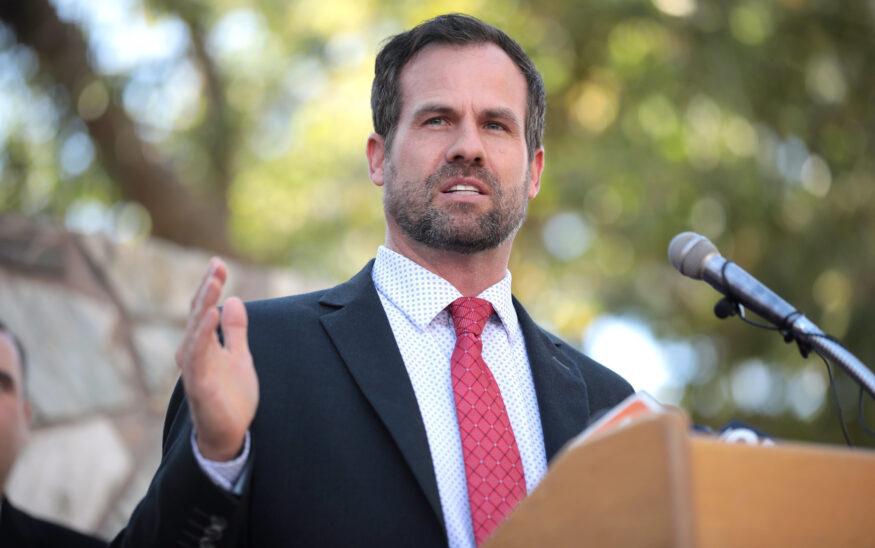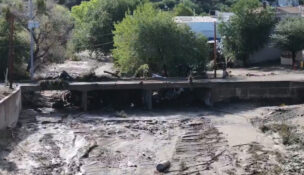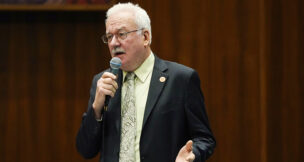Session Wrap: Warren Petersen’s priorities ahead of AG race
Jamar Younger Arizona Capitol Times//July 20, 2025//
Session Wrap: Warren Petersen’s priorities ahead of AG race
Jamar Younger Arizona Capitol Times//July 20, 2025//
For Senate President Warren Petersen, the next legislative session will likely be his last opportunity to help advance the Republican caucus’ legislative policy priorities.
Petersen is running for state attorney general in 2026, so he will look to work with his Senate Republican colleagues to revive legislation that either stalled or was previously vetoed, support the federal government on policies affecting Arizona and solidify the Senate’s relationship with House Republican leadership after the two chambers clashed during budget negotiations.
The following are responses provided by Petersen after inquiry from the Arizona Capitol Times. Answers have been edited slightly for clarity.
What do you consider some of the biggest accomplishments from this session?
Power and water are foundational elements that contribute to our population and business growth here in Arizona. We were able to pass meaningful legislation to help us keep up with the demand, which was shown with our historic water policy, enabling us to conserve and grow, using less water even with our growing population. In response to projections showing a 60% increase in power demand over the next 30 years, we passed legislation to strengthen our infrastructure and ensure Arizona families and businesses continue to have access to reliable and affordable energy. We made significant investments in public safety to keep Arizona communities secure and delivered tax cuts to support small business owners.
What were some of the biggest challenges?
One of the biggest challenges this session was the lack of efficiency, particularly with how long it took to pass the budget. There was clear frustration over the delays, and unnecessary division within the party made the process more difficult than it needed to be. In the end, the budget that passed was the Senate’s initial budget plan with some extra spending amended on by the other chamber.
Were you surprised that House leadership didn’t engage in the budget negotiations and instead released their own budget?
It was par for the course for this session. We saw the chaos unfold with the (Division of Developmental Disabilities) bill and how that was handled, so I’m not necessarily surprised, but I’m disappointed that the session was drawn out with unnecessary division in our party. Two years ago, we put a budget on Hobbs desk in February. The hope is we get back to that level of efficiency.
Where did some of that disagreement come from, especially during the budget?
I’ll just leave it at my (previous) statement. It’s the normal stuff. I think human nature can creep in. But there’s other things too. Anybody that was there … if you ask five people what it was, I think five people would probably all say similar things. So I’ll just leave it where it’s at. I mean, we’ve shown what we can do with divided government. Two years ago, we had budgets up on the governor’s desk in February with divided government. So (we can) be efficient, and hopefully, we’ll return to that next session.
What will it take for the House and Senate Republicans to solidify that relationship in time for next year’s budget?
I‘m confident the next session will look different. By bringing on Grant Hanna as the new Chief of Staff, the House is positioned to operate with significantly greater effectiveness.
Gov. Katie Hobbs vetoed a number of border bills, including the AZ ICE Act that you sponsored. You mentioned that you could bring the bill back as a ballot measure or wait to see if a new governor is elected. Is that still a possibility?
That’s a discussion we will have early on next session as a caucus, to see if it’s something we want to put on the ballot. I do feel confident that we will have a new governor in 2026 who will sign the legislation.
What were some of the other big issues that went unaddressed this session?
Two major issues that were left unaddressed are immigration and election reforms. We sent the AZ ICE Act to the governor’s desk, a bill that would have empowered local law enforcement to remove dangerous criminals from our streets, but she chose to veto it, putting both public safety and ICE agents in a more vulnerable position. She also vetoed our Florida-style election system bill which would have ensured faster, more transparent results on election night. Because of that veto, Arizonans will continue to face delays and uncertainty in our election process.
There were a number of bills that were introduced this session with the intention of expediting election results. Can those bills return next session?
We would definitely like to see those bills come back. We’re monitoring. All eyes are on 2026, and we’ll see how things are progressing. I think we’ll have a Republican governor. And you know, it may be best to just put our energy into making sure we get a Republican governor. And then 300 bills a session that are getting vetoed will get signed.
So anyway, we’ll look at it. I think it was close to a signature. So maybe … the bill gets tweaked a little bit and gets a signature, but we’ll see. We’ll have those discussions as we head into next session with the numbers.
What made this such an abnormal session?
The length. There’s absolutely no reason to be wrapping up the session on June 25. So mainly the budget.
What do you anticipate will be the most significant Republican priorities for the next legislative session?
Water will definitely be a key topic in the next session, but our primary focus will remain on protecting individual rights, supporting small businesses, and upholding core conservative values. A top priority will also be addressing staffing shortages in public safety, especially within the Department of Corrections, to ensure we can add and retain the people we need to keep Arizona safe. We’re also committed to advancing Prop 123 and working with the Trump Administration on federal regulations that impact our state. Additionally, we will continue to step in and defend laws that our current AG refuses to defend.
This will be your last session as Senate President before you run for attorney general. Is there anything you want to accomplish before you focus on that campaign?
We have the Arizona ICE Act, the Florida style elections. I have an SCR that I worked on that I would like to see passed that protects the taxpayer by a higher threshold for counties and cities to pass taxes. All three of those are important. Of course, we also have just the overarching issues that are important for Arizona: water, power. I’m sure I’ll get very involved with the water discussions as we go forward, continuing to deal with that. I don’t know that I’ll point to one bill that has to happen before I leave the Legislature. But those are things I’ll probably work on next session if there’s a path for a signature. I do like to spend my time on bills that have a good chance … that will be signed. Really, really, really, good chance of being signed. We’ll see what happens as we move forward.














































